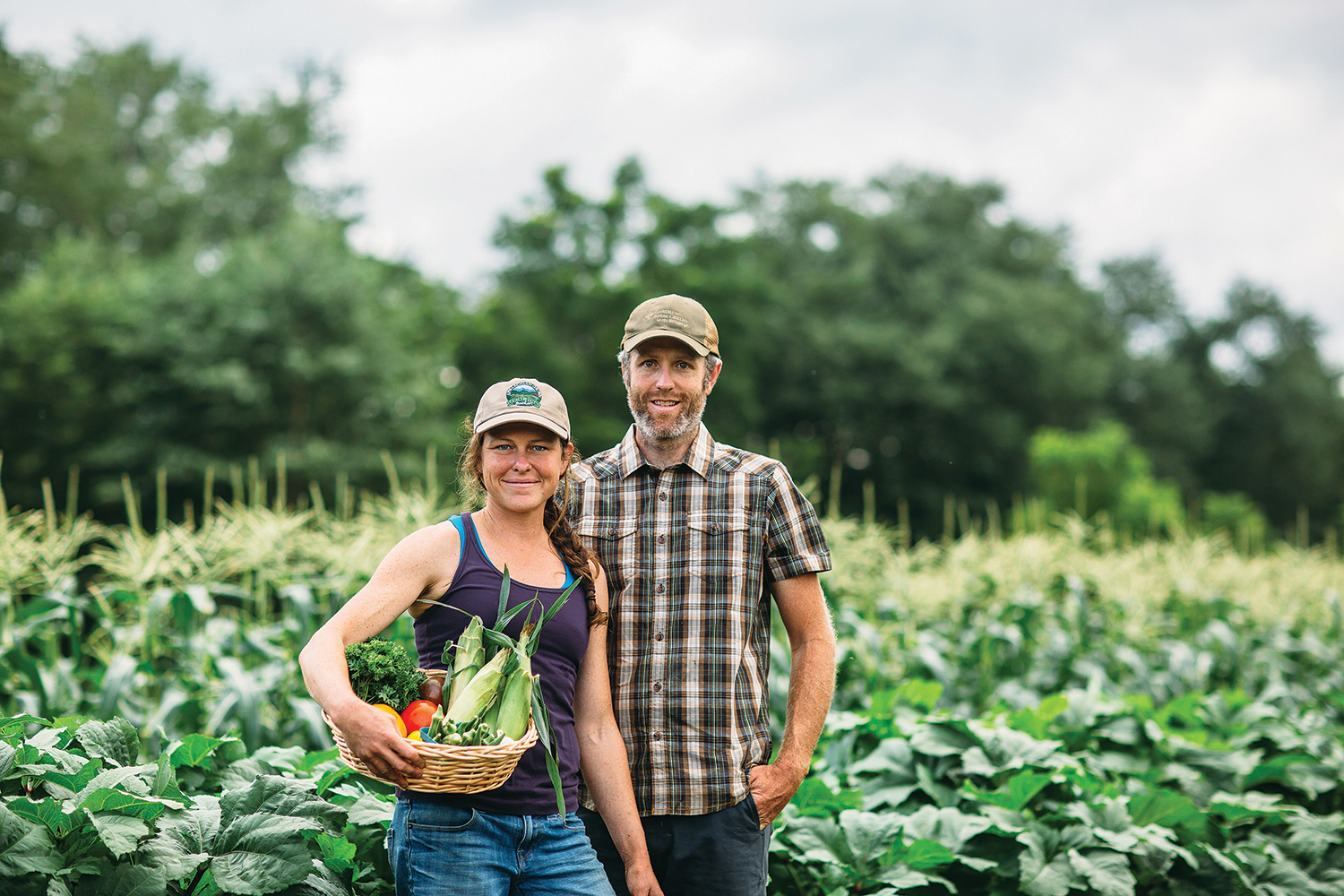
Pitch Pine Organic Farm owners Justin Dansby and Paige Witherington report on the late-summer harvest. Photo by Tim Robison
Botanists know Pinus rigida, or the pitch pine, to be hard wearing. As one of the most resilient eastern conifers, the twisted and gnarled softwood occupies areas that are odd and uninhabitable. It’s no wonder that after biking the 2.5-mile Pitch Pine Loop Trail in DuPont State Recreational Forest, a stretch canopied by evergreen foliage, Justin Dansby and Paige Witherington agreed on their livelihood’s namesake: Pitch Pine Farm.
“Our mission is to nourish the earth and its people with healthy food,” says Witherington, stooped over throngs of flowers. Her farm hand, Kim Conrads, harvests squash in an adjacent row as Dansby barrels by on the tractor. The Little River Valley parcel is subdivided into four plots, with unheated greenhouses sequestered on the upper side.
The former managers of Serenbe Farms, an organic, four-acre homestead amidst an urban development, the green agriculturists lacked the farming blood so commonly passed down through generations. Witherington even admits she didn’t enjoy her veggies growing up. Thus, it was a surprise when she cultivated a fondness for plowing and planting while in college in Missoula, Montana. Stultified by her internship, the engineering student began volunteering at a local farm. She then secured an apprenticeship at Sisters Hill Farm — a nonprofit homestead in New York’s Hudson Valley.
Burned out on computer science, a career that calls for “damp, dark cubicles,” Dansby found his own niche as a farmhand.
“It’s risky, sure,” the young farmer says. At only 34, he is nearly three decades younger than the average local agronomist. “But there’s this freedom in being outside and eating what comes from your garden.”
Two years after Witherington and Dansby started it, Pitch Pine Farm is now certified organic and resolute in providing Western North Carolina with sustainably produced fruits and veggies. Fields are rotated every three years and regularly blanketed in nitrogen-rich compost. The whole production relies on cover cropping and regular soil samples rather than chemicals. Beneficial insects — indicator species — are welcome as well.
“We saw potential here, and hard work, of course,” says Dansby. Scorching Wednesday mornings are reserved for packing CSA boxes with kale and lettuce mix, sweet corn, carrots, collard greens, and eggplants, and today is no exception. (The acronym stands for Community Supported Agriculture: consumers pay various rates of subscription and receive weekly shares of the crops.)
The challenging summer weather of 2016 — two months with almost no rain, followed by the current period of hours-long afternoon deluges — has increased the guesswork at the farm. Any seasoned grower knows to predict unpredictable weather, and Paige and Justin try to shelter some CSA favorites in their greenhouse. Out in the field, though, fall planting time has been slightly delayed, and tomatoes must be watched for blight.
“Farmers who have been working the ground for decades and decades would say that weather is getting weirder,” says Witherington. “But it’s never going to be 100-percent satisfactory. That’s the challenge and joy of farming —having to contend with what nature throws at you.”
Pitch Pine Farm’s organic produce can be purchased at Food Matters Market, Healthy Harvest Natural Foods, and City Market in Hendersonville. Witherington and Dansby also regularly attend the Transylvania Farmers Market on Saturdays from 8am-noon. pitchpineorganicfarm.com. 828-384-2300.
